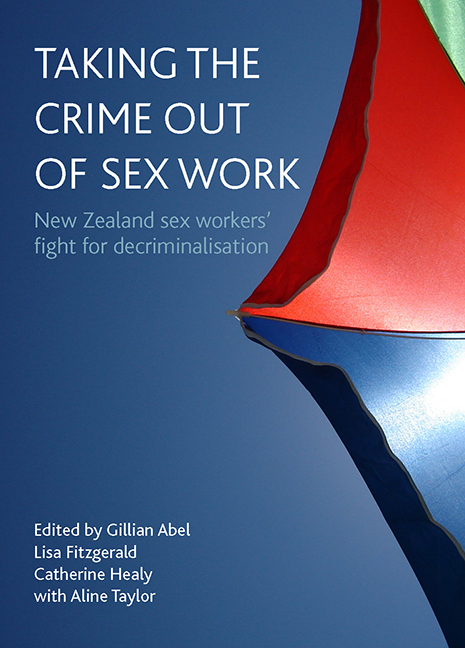Book contents
- Frontmatter
- Contents
- List of tables and figures
- Notes on contributors
- Acknowledgements
- one Introduction
- Part One Lead-up to the passing of the 2003 Prostitution Reform Act
- Part Two Implementation and impact of the 2003 Prostitution Reform Act: the first five years
- Index
- Also available from The Policy Press
seven - Review of the Prostitution Reform Act
Published online by Cambridge University Press: 01 September 2022
- Frontmatter
- Contents
- List of tables and figures
- Notes on contributors
- Acknowledgements
- one Introduction
- Part One Lead-up to the passing of the 2003 Prostitution Reform Act
- Part Two Implementation and impact of the 2003 Prostitution Reform Act: the first five years
- Index
- Also available from The Policy Press
Summary
Background
I had a 37-year career in the New Zealand police force, from 1964 to 2001. For two years, during the 1970s, I was appointed Officer in Charge of the Wellington Vice Squad. This role included, among many things, the investigation and prosecution of offences related to prostitution. There were two of us on the squad and we set about our task with enthusiasm and vigour.
The Vice Squad was principally interested in targeting offences relating to prostitution that were visible to the public. Consequently, much of our attention was focused on street-based sex workers, and on sex workers who provided their services to fishing crews on board the growing numbers of Asian fishing vessels that were coming into Wellington at the time – a result of the burgeoning New Zealand fishing industry. Of the sex workers working on the streets, transgendered persons were the most visible to the public. From a police enforcement perspective, they were also the easiest to prosecute because, as the homosexual law reform had not yet been enacted, sexual contact between males was deemed illegal in New Zealand. In prosecutions involving transgendered persons, therefore, all that needed to be proved was that there had been some form of sexual connection between males. The matter of whether or not payment for sexual services had been received was not relevant for prosecution.
A prominent person within the transgender community in Wellington at this time was Carmen. Carmen operated a well-known and respected coffee shop in the heart of the city and, although there was nothing outwardly obvious about Carmen's café to suggest sexual services were being offered within the premises, rumours to this effect circulated widely around Wellington. To people not otherwise involved in the sex industry, such rumours meant that visiting Carmen's café was alluring because it seemed risqué and exciting. We decided to target Carmen to establish whether or not sexual services were being offered on her premises. After establishing that they were, Carmen was arrested along with a transgendered sex worker who had been found working on site.
Following their arrest, a sensational hearing took place in the Wellington courts, during which media attention focused predominantly on the matter of whether the sex worker was male or female.
- Type
- Chapter
- Information
- Taking the Crime out of Sex WorkNew Zealand Sex Workers' Fight for Decriminalisation, pp. 105 - 118Publisher: Bristol University PressPrint publication year: 2010



